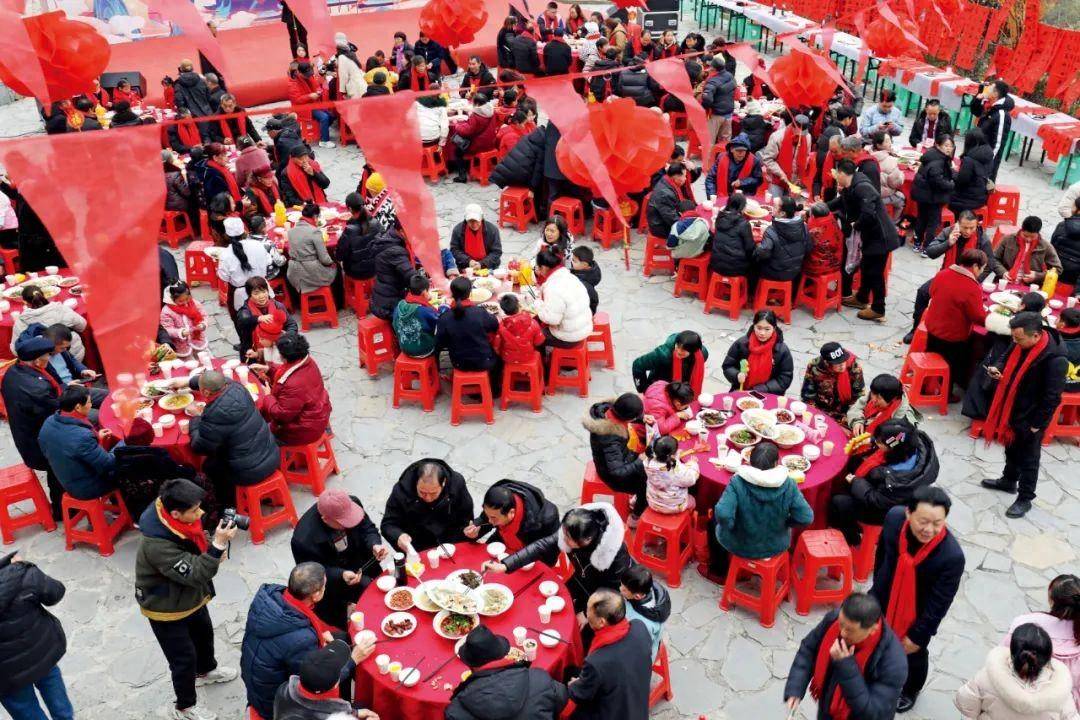蜂词
分题型分考点背单词 文
文 文
文
“除结婚酒、丧事以外的都属于无事酒,一律禁止滥办”“结婚酒需提前10天到社区居委会进行书面申报”“丧事可以在事中或事后5个工作日内到社区居委会报备”“如有不听劝阻滥办酒席的将由公安机关、市场监管局、消防等多家部门联合执法,所造成的后果由举办人和承办人自行承担”……
近日,重庆市南川区东城街道北郊社区居委会下发的一则《通知》引起舆论关注。该《通知》表示,做出上述规定的目的是“为了进一步遏制滥办宴席的不良风气”。
南川区文明办一位工作人员对媒体表示,区内婚丧宴需要填申请报备表,诸如升学宴、乔迁宴等宴席属于无事酒,“目前的政策是一律不准办”。
有的当地居民对此表示赞同,“在外打工一年省下来的钱,一个腊月、一个正月酒席钱支出就花光了”“风气极其不正,大家被迫不停摆酒收钱”。但也有居民表示,社区将满月酒、老人寿宴等宴请也一律禁办并不妥当。
4月9日,南川区文明办发布情况说明称,该区启动了滥办宴席专项治理工作,个别街道社区在工作执行过程中对政策理解存在偏差,存在工作方式“简单化”“一刀切”等问题,已指导相关街道社区立即停止不当做法。
“婚丧宴外的酒席一律禁办”
事实上,4月初,在北郊社区居委会之外,南川区多个社区居委会、村委会都下发了类似通知。
4月8日,南川区三泉镇观音村村委会发布通知称,结婚摆酒需提前5日到村委会申请报备,一天两餐,每餐不得超过40桌;丧事可以在事后5日内到村委会报备,每餐不得超过40桌;除结婚酒、丧事酒以外的都属于无事酒,一律禁止滥办。

1月30日,重庆沙坪坝区三河村的村宴现场。图/视觉中国
南川区南城街道南园路社区也发布了类似的通知,从4月1日起执行。该社区工作人员表示,“如果请客范围在8桌之内,且不收礼金的话,则算是家宴,不在范围内。像那种(办宴席)大张旗鼓,还要打个横幅,而且明确收取礼金的话,就肯定不行”。
事实上,早在2022年,南川区就出台过《关于进一步完善村(居)民操办宴席的通知》,要求将宴席治理纳入村(居)规民约,严格执行事前报批制度。今年3月26日,南川区区委书记主持召开会议时说,要充分认识滥办宴席专项治理工作的重要性,规范宴席行为,约束大操大办滥办宴席,大力倡导婚事新办、丧事简办、无事不办,整治“无事酒”“滥办宴席”等现象。
此前,南川区还曾出台过《加强操办宴席管理暂行规定》,明确宴席申请实行分级审批,要求公职人员不能以同一事重复操办,所设宴席不得超过20桌,时间限制在一天之内;不准动用公车、公物、公款操办,不准借婚丧嫁娶敛财,不准借配偶和直系亲属名义请客送礼,不准以任何方式邀请管理和服务对象。
南川区纪委相关负责人曾透露,“限宴令”出台两年内,砍掉过半宴席,19名公职人员被处理。
一年“泡酒”送两万礼金
在重庆,办酒席又叫“泡酒”。南山区出台对滥办酒席的整治通告,与当地长期以来滥办宴席有很大的关联。
早在2013年,《重庆日报》就曾报道称,南川区金山镇小河坝社区“民间宴席总管”透露,当地一些干部群众大办宴席成风,婚丧嫁娶、门市开业、乔迁新居、祖坟搬迁、孩子满月、子女参军和升学等,都要宴请亲朋好友、左邻右舍。据统计,社区5000多人,每年大摆宴席有320多次,平均每次80桌酒席。一年下来,每户要支出礼金2万多元。该报道还称,南川区金山镇的一位老太太的三个儿子为敛财,分别为她办了三次60岁寿宴。
时任南川区区纪委副书记介绍, 89.5%的受访者认为人情消费太重。
这一现象始终存在。2018年,《重庆日报》再次报道称,在南川区大观镇金龙村,因为搞乡村旅游比较富裕,“泡酒”逐渐由民间习俗演变为攀比、斗富的平台。宴请的名目数不胜数。当地一经营农家乐的村民称,整个2016年,光是“泡酒”,自己就送了近2万元礼金,“你不参加,别人认为你不合群、不讲情义”。
有当地网友于2023年在“重庆网络问政平台”吐槽留言,南川区的酒席实在是太多了,找各种理由和借口办酒,希望政府能严格控制和管理一下。
事实上,这一问题并不只是南川区独有的。同一时期,重庆綦江区政协官网发布的一篇文章称,有区政协委员反映称,一个月收入才几千元的家庭,每月大大小小的酒席开销就有一两千元,多的上万元。有时一天还要参加好几处宴席,导致广大干部群众疲于应付、苦不堪言。有时为了回本,总要想方设法办酒席,从而陷入恶性循环。部分村委会居委会制定了《村规民约》,但有些民众为了逃避处罚,在酒店、餐馆等地方办酒席。有的甚至异地办酒席(比如綦江的跑到习水去办),导致约束困难。
今年1月,重庆市丰都县南天湖镇人民政府也发布《关于整治滥办酒席的通告》,称可以正常操办的宴请酒席包括三类:婚礼、丧事,以及非国家工作人员为家中70岁及以上老人操办的旬酒。
通告对这些酒席也规定了申报程序。还进一步明确,操办以祝寿、乔迁、升学、满月、周岁、订婚、开业、店庆、参军等为名目,且以敛财为目的的各种宴请酒席,均属滥办酒席。以举办家宴名义,但邀请至亲(夫妻三代以内直系亲属)以外的人员参与并有收受礼金行为的,视为滥办酒席。操办人不听劝阻执意举办的,严格按《村规民约》《居民公约》兑现惩戒措施,并按《条例》有关规定纳入不文明行为记录,情节严重的,依法予以行政或司法处置。
重庆丰都县南天湖镇人民政府一位工作人员告诉《中国新闻周刊》,对相关整治活动,村民普遍非常理解,基本上都可以提前报备。
确实有不少网友对重庆几个区市的基层整治活动持赞同态度:“在南川工资不够份子钱,收到请帖后,我心头都在滴血,我曾经一个月收到21份请帖”“我非常支持对滥办宴席风气进行整治。娃儿满月办,一岁办,两岁有些还要办,考个初中都要办……”“我一个月工资3000元,随份子花了3500元”。
不过,也有网友质疑,为遏制滥办宴席的陋习,而采取“一刀切”式的简单粗暴做法是否合理,“居民委员会有没有权力干涉居民个人行动?”
基层如何更好推进移风易俗?
根据南川区不同居民委、村委会的通告,能办酒席的名目、申报程序均有明确规定。
中国政法大学比较法学研究院教授解志勇接受媒体采访时表示,从相关通知的表述看,很像是行政审批或者行政许可,而居民委员会是没有权力去设定许可、实施许可的。“要求酒楼在接待酒席预订时查看申报表更是有点莫名其妙。酒楼遵守食品安全法等法律法规依法经营就可以了,居民委员会无权去插手经营主体的合法经营活动。”
武汉大学社会学院教授、中国乡村治理研究中心研究员吕德文也告诉《中国新闻周刊》,基层制定的一些提示、通知等规定,都不属于行政许可范畴,不可能强制要求群众去提前备案,这些要求也很难执行。
他进一步指出,基层干部在推进移风易俗、遏制滥办宴席等工作时,并非是在“没事找事”。现实中,一些群众也确实对不良风俗、滥办宴席等表达不满。但在实施过程中,有些基层干部为了快速见效而强行推进,不顾及具体的法律要求。
中国政法大学副教授蔡乐渭也告诉《中国新闻周刊》,居委会和村委会只是基层群众性自治组织,除非有法律的特别规定,它们并没有任何行政权力。这些案例说明,一些基层自治组织对自我性质、自我定位的认识也出现了偏差,他们不是执法机关,更不是行政权力的执行者。
民俗学专家、上海大学中文系教授黄景春告诉《中国新闻周刊》,长期以来,如何解决传统民俗与现代社会管理的矛盾是乡村治理的棘手问题。大操大办宴席等确实让民俗文化变味变质,但政府介入后,如何管理疏导、如何移风易俗,也确实不容易把握。“一些习俗变质为民间的不正之风,政府需要认真引导,做好思想疏导工作。否则,如果仅依赖硬性的行政权力,粗暴制止,只会激化矛盾,也治标不治本。”
发于2024.4.22总第1137期《中国新闻周刊》杂志
杂志标题:重庆多地禁办“无事酒”
记者:周群峰
编辑:徐天
新闻译文:
"Except for wedding drinks and funerals, all other types of banquets are considered as idle drinks and indiscriminate handling is strictly prohibited." "Wedding drinks must be reported in writing to the community neighborhood committee 10 days in advance." "Funerals can be reported to the community neighborhood committee within 5 working days during or after the event." "If there is any unauthorized handling of banquets, it will be jointly enforced by the public security organs, the market supervision bureau, the fire department, and other departments. The consequences caused will be borne by the organizer and the person in charge."
Recently, a notice issued by the Beijiao Community Neighborhood Committee of Dongcheng Street, Nanchuan District, Chongqing has attracted public attention. The notice states that the purpose of making the above regulations is "to further curb the bad atmosphere of indiscriminate hosting of banquets.".
A staff member of the Civilization Office in Nanchuan district told the media that an application form needs to be filled out for wedding and funeral banquets within the district. Banquets such as school entrance banquets and housewarming banquets are considered as idle drinks, and "the current policy is that they are not allowed to be held.".
Some local residents agree with this, saying, "The money saved from working outside for a year is spent on banquet expenses in December and January." "The atmosphere is extremely unhealthy, and everyone is forced to keep serving alcohol and collecting money.". But some residents also expressed that it is not appropriate for the community to ban banquets such as full moon wine and elderly birthday parties.
On April 9th, the Civilization Office of Nanchuan District issued a situation statement stating that the district has launched a special campaign to crack down on excessive hosting of banquets. Some street communities have deviated from their understanding of policies during the implementation process, and there are problems with "simplification" and "one size fits all" work methods. Relevant street communities have been instructed to immediately stop inappropriate practices.
"Banquets outside wedding and funeral banquets are strictly prohibited."
In fact, in early April, several community committees and village committees in Nanchuan District issued similar notices outside of the Beijiao Community Neighborhood Committee.
On April 8th, the village committee of Guanyin Village in Sanquan Town, Nanchuan District issued a notice stating that for wedding banquets, it is necessary to apply for registration at the village committee 5 days in advance, with two meals a day and no more than 40 tables per meal; The funeral can be reported to the village committee within 5 days after the event, and each meal cannot exceed 40 tables; Except for wedding and funeral drinks, they are all considered idle drinks and are strictly prohibited from being consumed indiscriminately.
On January 30th, at the village banquet in Sanhe Village, Shapingba District, Chongqing. Image/Visual China
The Nanyuan Road community in Nancheng Street, Nanchuan District has also issued a similar notice, which will be implemented from April 1st. The community worker stated, "If the range of guests is within 8 tables and no gift money is collected, it is considered a family banquet and not within the range. For example, if a banquet is held with great fanfare and a banner is displayed, and the gift money is clearly collected, it is definitely not acceptable.".
In fact, as early as 2022, Nanchuan District issued a notice on further improving the management of banquets by village (residential) residents, requiring the inclusion of banquet management in village (residential) rules and regulations, and strict implementation of the pre approval system. On March 26th of this year, the Secretary of the Nanchuan District Party Committee presided over a meeting and said that it is important to fully recognize the importance of the special governance of excessive banquets, regulate banquet behavior, restrain excessive banquets, vigorously advocate for new weddings, simplified funerals, and nothing to do, and rectify phenomena such as "drinking without incident" and "excessive banquets".
Previously, Nanchuan District had also issued the "Interim Provisions on Strengthening the Management of Banquets", which clearly stipulated that banquet applications should be subject to hierarchical approval, requiring public officials not to repeatedly handle the same thing, and the number of banquets set up should not exceed 20, with a time limit of within one day; It is not allowed to use public vehicles, public property, or public funds to handle affairs, it is not allowed to accumulate wealth through weddings and funerals, it is not allowed to invite guests and gifts in the name of spouses and direct relatives, and it is not allowed to invite management and service objects in any way.
The relevant person in charge of the Discipline Inspection Commission of Nanchuan District has revealed that within two years of the implementation of the "Banquet Restriction Order", more than half of the banquets have been cut off, and 19 public officials have been dealt with.
A gift of 20000 yuan per year for "brewing wine"
In Chongqing, hosting a banquet is also known as "brewing wine". The Nanshan District has issued a notice to crack down on the excessive hosting of banquets, which is closely related to the long-standing practice of hosting banquets in the local area.
As early as 2013, Chongqing Daily reported that the "General manager of Folk Banquets" in Xiaoheba Community, Jinshan Town, Nanchuan District, revealed that some local officials and masses were popular in hosting banquets, including weddings, funerals, opening stores, relocating to new homes, relocating ancestral graves, having children reach their full moon, enlisting in the military, and pursuing further education. They all invited family, friends, and neighbors to attend banquets. according to statistics, there are over 5000 people in the community, and there are more than 320 grand banquets held each year, with an average of 80 tables per banquet. Over the course of a year, each household will have to pay a gift of over 20000 yuan. The report also stated that the three sons of an elderly woman in Jinshan Town, Nanchuan District, held three 60th birthday banquets for her to save money.
According to the Deputy Secretary of the Discipline Inspection Commission of Nanchuan District at the time, 89.5% of the respondents believed that human consumption was too heavy.
This phenomenon always exists. In 2018, Chongqing Daily once again reported that in Jinlong Village, Daguan Town, Nanchuan District, due to the relatively affluent rural tourism, "brewing wine" gradually evolved from a folk custom to a platform for comparing and competing for wealth. There are countless names invited for the banquet. A local villager who runs a farmhouse said that throughout 2016, he gave nearly 20000 yuan as a gift just for "making wine". "If you don't participate, others will think you are not sociable and do not show loyalty.".
In 2023, a local netizen left a message on the "Chongqing Online Politics Platform" roast that there were too many banquets in Nanchuan District, so they looked for various reasons and excuses to serve wine, hoping that the government could strictly control and manage it.
In fact, this issue is not unique to Nanchuan District. During the same period, an article published on the official website of the Qijiang District Political Consultative Conference in Chongqing stated that some members of the committee reported that families with a monthly income of only a few thousand yuan would spend one or two thousand yuan, or tens of thousands of yuan, on various banquet expenses each month. Sometimes there are several banquets to attend in a day, which leads to the exhaustion and unbearable suffering of the cadres and masses. Sometimes, in order to make a profit, we always have to find ways to hold banquets, which leads to a vicious cycle. Some village committees and neighborhood committees have formulated village rules and regulations, but some people hold banquets in hotels, restaurants, and other places to avoid punishment. Some even hold banquets in other places (such as running to Xishui in Qijiang), which leads to difficulties in restraint.
In January of this year, the People's Government of Nantianhu Town, Fengdu County, Chongqing, also issued a notice on cracking down on the indiscriminate hosting of banquets, stating that there are three types of banquets that can be organized normally: weddings, funerals, and banquets organized by non-state workers for elderly people aged 70 and above at home.
The notice also stipulates the declaration procedure for these banquets. It is further clarified that organizing various banquets and banquets under the pretext of birthday wishes, housewarming, further education, full moon, one year old, engagement, opening, store celebrations, military service, etc., and with the purpose of accumulating wealth, are all considered excessive banquets and banquets. If a family banquet is held under the guise of inviting individuals other than close relatives (within three generations of the husband and wife) to participate and accepting gifts, it shall be deemed as indiscriminate hosting of the banquet. If the organizer refuses to listen to dissuasion and insists on holding the event, disciplinary measures shall be strictly implemented in accordance with the Village Regulations and Residents' Convention, and records of uncivilized behavior shall be included in the relevant provisions of the Regulations. If the circumstances are serious, administrative or judicial sanctions shall be imposed in accordance with the law.
A staff member of the People's Government of Nantianhu Town, Fengdu County, Chongqing, told China Newsweek that villagers generally understand the relevant rectification activities and can basically report them in advance.
Indeed, many netizens agree with the grassroots rectification activities in several districts and cities in Chongqing: "In Nanchuan, the salary is not enough, and after receiving the invitation, my heart is dripping with blood. I once received 21 invitations in a month." "I strongly support the rectification of the excessive hosting of banquets. Children are allowed to hold banquets at full months, one year old, some at two years old, and even take the junior high school entrance exam..." "My monthly salary is 3000 yuan, and I spent 3500 yuan with the invitation.".
However, some netizens also question whether it is reasonable to adopt a "one size fits all" simple and crude approach to curb the bad habit of hosting banquets. "Do resident committees have the power to interfere with individual actions of residents?"
How can grassroots better promote the transformation of customs and traditions?
According to the notices from different resident and village committees in Nanchuan District, there are clear regulations on the names and application procedures for hosting banquets.
Professor Xie Zhiyong from the Institute of Comparative law at China University of Political Science and Law stated in a media interview that from the wording of the relevant notice, it seems to be administrative approval or licensing, and the residents committee does not have the power to set or implement licenses. "It's a bit inexplicable to require restaurants to check the declaration form when receiving banquet reservations. Restaurants can operate in accordance with laws and regulations such as the Food Safety Law, and residents' committees have no right to interfere with the legitimate business activities of the operating entities."
Lv Dewen, a professor at the School of Sociology at Wuhan University and a researcher at the China Rural Governance Research Center, also told China Newsweek that some guidelines, notices, and other regulations formulated at the grassroots level are not within the scope of administrative licensing, and it is impossible to force the public to file in advance. These requirements are also difficult to implement.
He further pointed out that grassroots cadres are not seeking trouble when promoting the transformation of customs and curbing the indiscriminate hosting of banquets. In reality, some people do express dissatisfaction with bad customs and excessive hosting of banquets. However, during the implementation process, some grassroots cadres forcefully push forward in order to achieve quick results, disregarding specific legal requirements.
Associate Professor Cai Lewei of China University of Political Science and Law also told China Newsweek that neighborhood committees and village committees are only grassroots mass autonomous organizations, and unless there are special legal provisions, they do not have any administrative power. These cases demonstrate that some grassroots autonomous organizations have also deviated from their understanding of their own nature and positioning. They are not law enforcement agencies, let alone executors of administrative power.
Folklore expert and professor of Chinese literature at Shanghai University, Huang Jingchun, told China Newsweek that for a long time, solving the contradiction between traditional customs and modern social management has been a thorny issue in rural governance. The grand banquets and other events have indeed made folk culture taste bad, but after the government intervenes, it is indeed difficult to grasp how to manage and guide, and how to change customs. "Some customs have degenerated into unhealthy practices among the people, and the government needs to guide them seriously and do a good job in ideological guidance. Otherwise, relying solely on hard administrative power and rudely stopping them will only exacerbate conflicts and address the symptoms rather than the root cause."
Published in the 1137th issue of China Newsweek magazine on April 22, 2024
Magazine Title: Prohibition of "Unscrupulous Alcohol" in Multiple Regions of Chongqing
Reporter: Zhou Qunfeng
Editor: Xu Tian
丧事 funeral arrangements ; things to do with a funeral ; funeral affairs
工作日 weekday ; working day ; workday ; day
办酒席 prepare a feast
公安机关 public security organization ; public security unit
承办人 undertaker ; contractor
重庆市 Chongqing ; CQ ; China's Chongqing Municipality
南川 Nanchuan ; Namtheun ; Namthuen ; Namtheum
北郊 Northern suburbs
宴席 banquet ; feast ; banqueting table
工作人员 staff ; worker ; working personnel ; staff member ; functionary ; operative
句子成分分析:
These cases demonstrate | that some grassroots autonomous organizations have [also] deviated from their understanding
(of their own nature and positioning).They are not law enforcement agencies, let alone executors (of administrative power).
句子语法结构详解:
* demonstrate 为谓语,采用一般现在时。
* that 为连词,引导宾语从句。
* deviated 为谓语,采用现在完成时。
* are 为系动词作谓语,采用一般现在时。
* they 为人称代词主格。their 为形容词型物主代词。have 为助动词。
句子相关词汇解释:
Phrase:
| deviate from... | 偏离,背离(路线﹑ 标准等);违背 |
| let alone | 更别提,更别说,更不必说 |
Vocabulary:
| these [ði:z] | a. | 这些 |
| case [keis] | n. | 1) (侦查或诉讼的)案件 2) 箱, 盒, 容器 |
| demonstrate ['demәnstreit] | vt. | 1) 证明,证实,论证,说明 2) 示范,演示 |
| some [sʌm] | a. | 1) 一些 2) 某一, 某个 |
| grassroots | a. | 一般民众的, 基层的, 草根的 |
| autonomous [ɔ:'tɔnәmәs] | a. | 1) (国家,地区,组织等)自治的, 有自治权的 2) (指人)自主的 |
| organization [,ɔ:gәnai'zeiʃәn] | n. | 1) 组织,团体,机构 2) 组织工作,筹备工作 |
| also ['ɔ:lsәu] | ad. | 而且;此外;也;同样 |
| understanding [,ʌndә'stændiŋ] | n. | 1) 理解,了解 2) 协议 |
| own [әun] | a. | 1) 自己的,本人的 2) 自己做的,为自己的 |
| nature ['neitʃә] | n. | 1) 大自然 2) 本性, 天性, 性格 |
| and [ænd] | conj. | 1) 和, 与, 同, 并 2) 然后,接着 |
| law [lɔ:] | n. | 1) 法律,法规 2) 原理,定律 |
| enforcement [in'fɔ:smәnt] | n. | 强制执行,厉行实施 |
| agency ['eidʒәnsi] | n. | 1) 服务机构,(尤指)代理机构,经销机构 2) 专门机构 |
| executor [ig'zekjutә] | n. | 遗嘱执行人(或银行等) |
| administrative [әd'ministrәtiv] | a. | 管理的,行政的 |
| power ['pauә] | n. | 1) 力,力量,能量 2) 控制力,影响力,操纵力 |
句子成分分析:
If a family banquet is held [under the guise (of inviting individuals [other than close relatives ([within three generations
(of the husband and wife)])] to participate and accepting gifts)], || it shall be deemed [as indiscriminate hosting [of the
banquet]].
句子语法结构详解:
(held 为 hold 的过去分词。)
* if 为连词,引导条件状语从句。
* held 为谓语,采用一般现在时和被动语态。
* inviting 为动名词。
* to participate 为不定式,作状语。
* accepting 为动名词。
* it 开头为陈述句。
* deemed 为谓语,采用被动语态。
* hosting 为动名词,作介词宾语。
* shall 为情态动词。is, be 为助动词。the 为定冠词。a 为不定冠词。
句子相关词汇解释:
Phrase:
| other than | 1) 除了...(之外) (表示所说的不包括在内) 2) 不同于 |
Vocabulary:
| if [if] | conj. | 1) 如果, 倘若 2) 是否 |
| family ['fæmәli] | n. | 1) 家庭 2) 亲属 |
| banquet ['bæŋkwit] | n. | 宴席,盛宴 |
| hold [hәuld] | vt. | 1) 拿着,抓住,抱住,托住,夹着,捂住, 按住 2) 使保持(在某位置), 固定住 |
| under ['ʌndә] | prep. | 1) 在(某年龄)以下 2) 在...下面, 在...下方 |
| guise [gaiz] | n. | 表现形式;外貌;伪装;外表 |
| invite [in'vait] | vt. | 1) 邀请 2) (正式)邀请,请求,要求 |
| individual [,indi'vidʒuәl] | n. | 1) 个人 2) 与众不同的人,有个性的人 |
| close [kləʊs] | a. | 1) (家庭关系)亲近的 2) (在空间、时间上)近的 |
| relative ['relәtiv] | n. | 1) 亲戚,亲属 2) 同类事物 |
| three [θri:] | num | 三 |
| generation [,dʒenә'reiʃәn] | n. | 1) 一代人 2) 一批,一届 |
| husband ['hʌzbәnd] | n. | 丈夫 |
| and [ænd] | conj. | 1) 和, 与, 同, 并 2) 然后,接着 |
| wife [waif] | n. | 妻子,太太 |
| participate [pɑ:'tisipeit] | vi. | 参加,参与 |
| accept [әk'sept] | vt. | 1) 收受,接受(建议、邀请等) 2) (认为合适或足够好而)接受 |
| gift [gift] | n. | 1) 礼物 2) 天才,天赋 |
| deem [di:m] | vt. | 认为,视为,相信 |
| as [æz] | prep. | 1) 作为, 当作 2) 像,如同 |
| indiscriminate [,indis'kriminit] | a. | 1) 随意的;恣意的;不加选择的 2) 不加分析的;不加判断的 |

以上是蜂词为您整理编写的文章《重庆多地禁办“无事酒”背后 ——秒词邦背单词app》的全部内容。蜂词是国内权威分题型分考点背诵中高考/四六级考研/专升本/出国单词的专业单词软件。扫描如下小程序码,进入蜂词官方小程序获取更多英语相关资料! 【关键词:高考单词;高考英语;高中单词;高中英语;单词app;单词软件;记单词app;记单词软件;背单词软件;背单词app;英语单词;四六级单词;四六级英语;四六级单词app;四六级单词软件;考研单词app;考研单词软件;核心单词;高考冲刺复习;高考英语教材;高考英语真题;四六级真题;四六级试题;考研真题;考研英语单词;考研英语真题】





